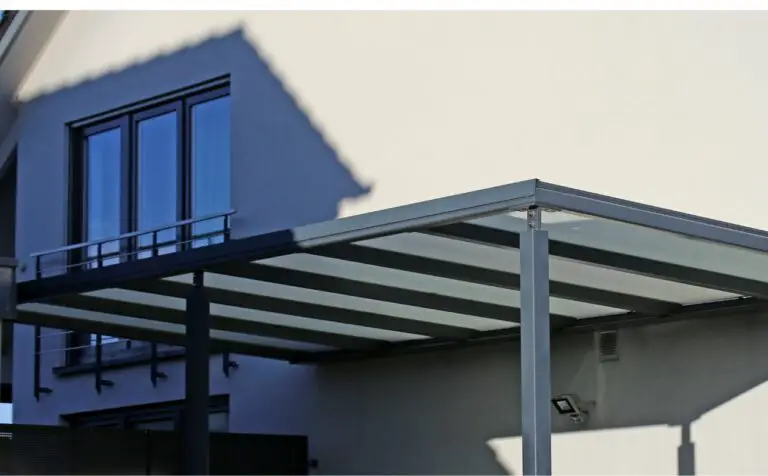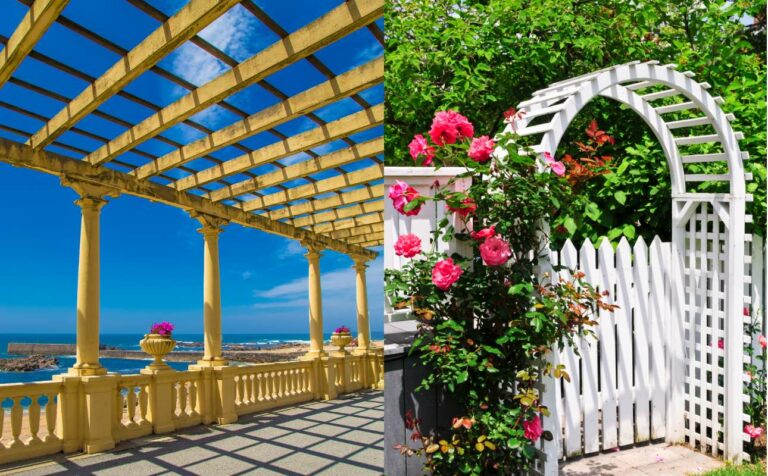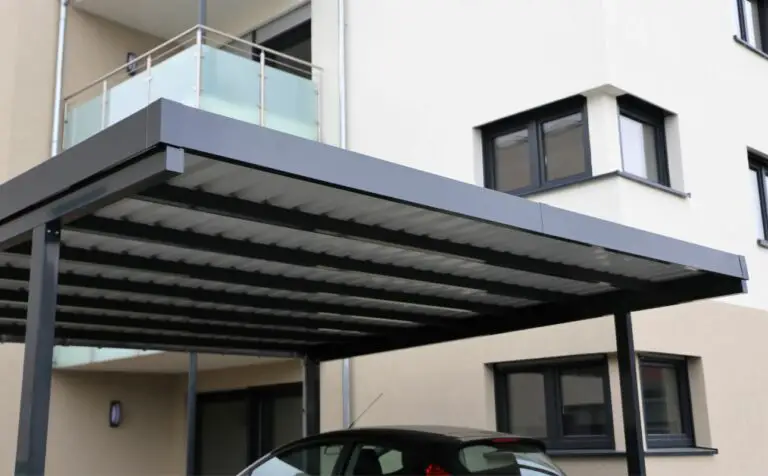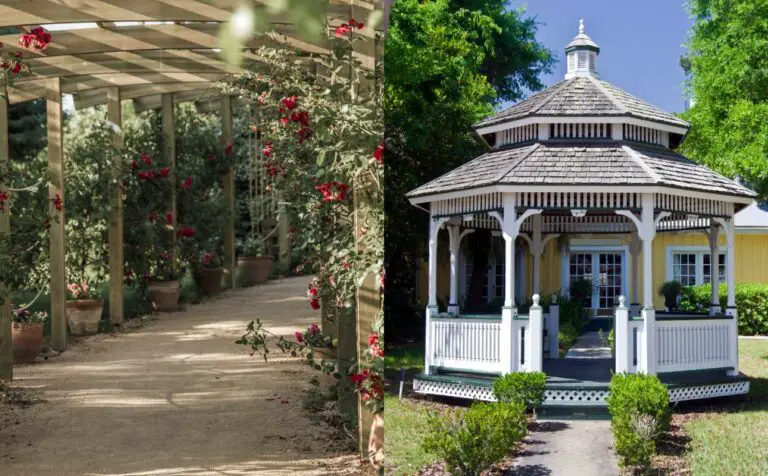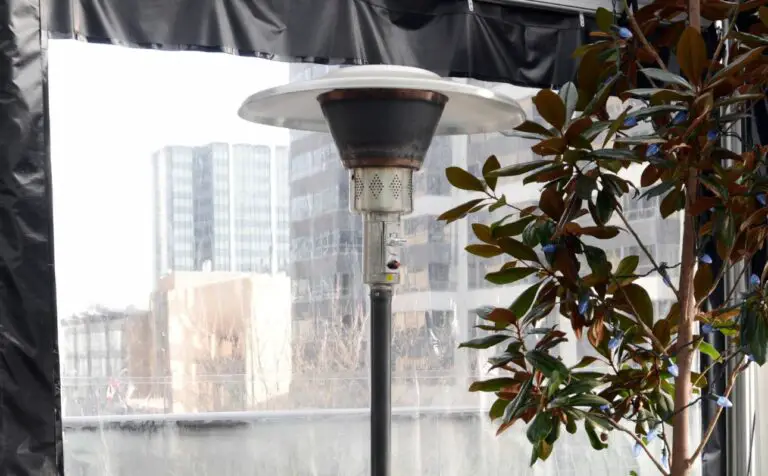What Are Carports Made Of? (For Beginners)
Carports come in different shapes and sizes, and most importantly, they are made from various materials. Choosing the right material is crucial since it will determine how much protection your carport can provide, as well as its durability and overall look.
In this article, we will explore the different materials used to make carports. These include wood, metal, fabric, and plastic.
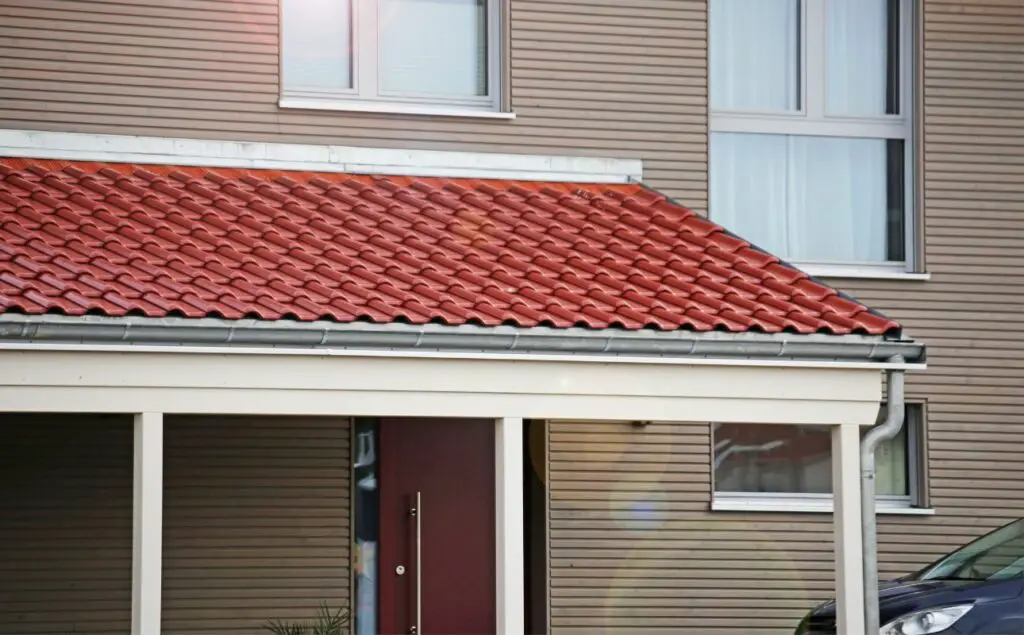
Wood Carports
The construction of wooden structures for the protection of vehicles has been a popular choice among homeowners due to its natural beauty and versatility. Wood carports are aesthetically pleasing and can blend in well with the surrounding landscape. They also offer design ideas that allow for customization, such as adding storage space or incorporating solar panels on the roof.
However, wood carports require regular maintenance to prevent damage from rot, insects, and weathering. Homeowners should consider applying sealant or paint every few years to protect against moisture and sunlight exposure.
Despite the upkeep required, wood carports remain a beloved option for those seeking an elegant shelter for their vehicles.
Metal Carports
Metal carports are designed to provide a strong and durable shelter for vehicles, boats, and other outdoor equipment. They are constructed using high-quality steel or aluminum materials that offer excellent resistance to harsh weather conditions and corrosion.
Strength and Durability
The structural integrity of metal carports is highly commendable, withstanding the test of time and weathering the harshest of climates. Made from sturdy materials like steel or aluminum, these structures offer strength and durability that can rival traditional garages.
Their benefits include being resistant to rot, mildew, and pests, as well as being able to withstand heavy snow loads and strong winds. However, drawbacks include their susceptibility to rust and corrosion if not properly maintained.
When compared to traditional garages, metal carports are often more cost-effective and easier to install. Overall, they provide a reliable and long-lasting solution for protecting vehicles from harsh weather conditions while requiring little maintenance.
Low Maintenance
Maintaining the durability and longevity of structures is a crucial aspect, much like tending to a garden with consistent care and upkeep to ensure its growth and prosperity.
When it comes to carports, low maintenance is one of the benefits that make them an attractive choice for homeowners. These structures are typically made from materials such as steel, aluminum or wood, all of which require little upkeep beyond occasional cleaning to remove dirt and debris.
This makes carports an incredibly cost-effective option for those seeking shelter for their vehicles without incurring high maintenance costs over time. With minimal effort required on the part of the homeowner, carports offer long-lasting protection against weather elements and add value to any property.
Variety of Styles and Colors
A plethora of options in terms of design and colors are available when it comes to constructing shelters for vehicles, allowing homeowners to choose a style that not only complements the aesthetics of their homes but also provides sufficient protection against weather elements.
Some of the styles available include gabled, flat roof, and hip roof carports, each with its own pros and cons. Gabled carports offer additional height clearance and ventilation, while flat roof ones have a modern look and are easy to install. Hip roof carports provide better stability during strong winds but may be more expensive to build.
In addition to these styles, carports come in a variety of colors ranging from neutral shades such as beige or white to bold hues like red or blue. This means that homeowners can easily find a color that matches their home’s exterior without compromising on functionality. However, it is important to note that some colors may fade over time due to exposure to UV rays or extreme weather conditions.
Fabric Carports
Fabric carports are becoming increasingly popular due to their lightweight and portable design, making them easy to transport and set up in various locations. They offer a quick and simple solution for temporary shelter from the elements, without requiring any permanent installation or construction.
Lightweight and Portable
The chosen materials for lightweight and portable carports must possess specific characteristics that make them ideal for this type of protective structure. These materials should be easily transportable, with a low density to allow for effortless movement and maneuverability.
The portability benefits of these carports are essential, as they enable users to move them from one location to another conveniently. When comparing various materials used in the construction of these carports, it is crucial to consider factors like weight, durability, and ease of maintenance.
Some common materials used include aluminum frames covered with polyethylene or polyester fabric, which makes them both durable and lightweight. Additionally, these structures can be folded down into compact sizes when not in use. This feature makes them easy to store in small spaces such as garages or sheds until needed again.
Easy to Set Up and Take Down
Another advantage of carports is their easy setup and takedown, making them a popular choice for temporary shelter options. Here are some reasons why:
- No foundations required: Unlike traditional garages, carports can be set up on any level surface without the need for a concrete foundation.
- Minimal tools needed: Most carport kits come with all the necessary hardware and instructions for assembly, requiring only basic hand tools like screwdrivers and wrenches.
- Quick installation time: Depending on the size and complexity of the design, a carport can be assembled in just a few hours or less.
- Easy disassembly: Carports are also designed to be easily taken down when no longer needed or when moving to another location.
This makes them an ideal option for those who need affordable temporary shelter that doesn’t require permanent installations or extensive construction projects. Moreover, this ease of setup also means that you can take your portable shelter wherever you need it – from camping trips to outdoor events – providing flexibility in how you use your space.
Affordable Option
When considering parking solutions, affordability is an important factor to consider, making the option of a temporary shelter like a carport an attractive choice for those on a budget.
Carports are known for being a cost-effective alternative to building a traditional garage, as they are made from simple materials and require minimal labor to set up. DIY options are available for those who enjoy customization possibilities and want to save even more money by assembling their own carport.
Plastic Carports
Plastic carports are a popular choice for outdoor shelter due to their weather-resistant properties. They are designed to withstand harsh weather conditions such as heavy rainfall, snow, and strong winds. Additionally, plastic carports are lightweight and easy to install, making them a convenient option for those who need quick and efficient shelter solutions.
Weather-Resistant
The utilization of durable and corrosion-resistant materials has become increasingly common in the construction of covered parking structures due to their ability to withstand the harsh effects of time and exposure to the elements.
Weather-resistant carports made from materials such as aluminum, steel or galvanized metal have numerous benefits. They are resistant to rust, corrosion, rotting, warping, and fading. This makes them ideal for outdoor environments where they will be exposed to rain, snow, wind and other weather conditions.
Additionally, these carports are easy to clean and maintain with minimal effort required. Installation methods for weather-resistant carports vary depending on the material used but can typically be completed quickly with minimal tools required.
Lightweight and Easy to Install
With their lightweight nature and ease of installation, these weather-resistant structures offer a cost-effective and environmentally friendly solution for those seeking to protect their vehicles from the elements.
Carports are typically made of materials such as aluminum or steel, which possess an inherent strength that allows them to withstand harsh weather conditions while also being easy to install.
The lightweight nature of carports means that they can be easily transported and assembled without requiring specialized equipment, making them a popular choice among homeowners looking for a low-maintenance option.
Low Maintenance
Maintaining a weather-resistant structure can be time-consuming and costly, but carports offer a low-maintenance option due to their inherent strength and durability.
Cost-effective designs and eco-friendly options make carports an attractive choice for homeowners who want to protect their vehicles from the elements without breaking the bank or harming the environment.
Unlike traditional garages, carports require minimal upkeep, as they are made of materials that resist rust, corrosion, and fading.
Choosing the Right Material
Selecting the appropriate building material for a carport is a crucial decision that requires careful consideration of factors such as durability, cost, and overall aesthetic appeal.
There are several materials to choose from when constructing a carport, each with its own benefits and environmental impact.
To help make an informed decision, consider the following list of material options:
- Steel – offers excellent durability and strength at an affordable price point. It is low maintenance and can be coated to prevent rust or corrosion. However, it may not be as visually appealing as other options.
- Wood – provides natural beauty and can be customized to fit any style preference. It is also eco-friendly if sourced sustainably. However, it requires regular maintenance to avoid rotting or warping over time.
- Aluminum – lightweight yet strong, resistant to rust and corrosion, easy to maintain and comes in various colors and finishes for an attractive appearance. While it may be more expensive than steel or wood, it is long-lasting with minimal environmental impact compared to other materials like vinyl or plastics commonly used in carports construction today.
What Are Mobile Home Carports Made Of
Mobile home carports, much like traditional carports, can be made from a variety of materials. However, given the specific needs of mobile homes, the material choice often factors in considerations such as portability, ease of assembly, and resistance to various weather conditions. Here’s a look at the typical materials:
- Steel: This is a popular choice due to its durability and robustness. Galvanized or powder-coated steel provides excellent resistance to rust and other weather-related damage. However, steel carports tend to be heavier and may require more effort to install or move.
- Aluminum: Aluminum carports are lighter and easier to assemble and disassemble, making them a convenient choice for mobile home owners. They also offer good resistance to corrosion but may not withstand heavy winds or impacts as well as steel.
- Fabric or Polyethylene: These materials are often used for portable or temporary carports. They are easy to install, lightweight, and usually treated to be UV and water-resistant. However, they don’t provide the same level of protection or durability as metal carports.
- Wood: While not as common for mobile home carports due to its weight and less portability, wood can be used for semi-permanent or permanent carport structures. Wooden carports can offer a natural aesthetic appeal but require regular maintenance to prevent rot and insect damage.
The Bottom Line
When it comes to choosing the right material for a carport, there are several options available. Wood carports offer a traditional and rustic look while metal carports provide durability and strength. Fabric carports are lightweight and easily portable whereas plastic carports are affordable and easy to assemble.
Selecting the appropriate material depends on various factors such as budget, location, purpose, and personal preference. Ultimately, the chosen material should not only fulfill its functional purpose but also complement the aesthetic of the surrounding landscape.
With careful consideration of these factors, homeowners can make an informed decision about what type of material is best suited for their specific needs. A well-built carport made of quality materials will last for years and enhance the overall value of any property while providing peace of mind that vehicles remain protected from harsh weather conditions.
